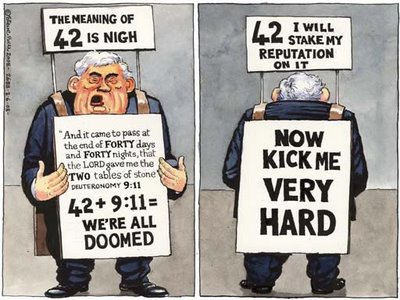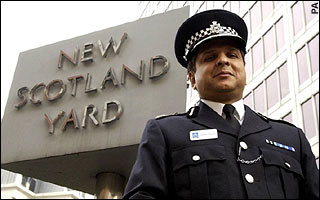 If it wasn't so serious it would almost be funny. The latest safeguard that will stop 42 days detention without charge being used to hold anyone with a beard and funny ideas is that the Home Secretary herself will have to decree that the extension can only be used when there is a "grave exceptional terrorist threat", such as an attack on the level of 7/7 taking place or feared to be about to take place. Like with all the other safeguards, it's both pointless and worthless. We're being constantly reminded that the threat we face from terrorism is, in the words of the ex-head of Scotland Yard's anti-terrorist squad Peter Clarke, "deadly and enduring". The brown-trousers-o-meter already declares that the current threat level is "severe", which means an attack is highly likely. How could we possibly tell the difference between a "grave exceptional" threat and the current level?
If it wasn't so serious it would almost be funny. The latest safeguard that will stop 42 days detention without charge being used to hold anyone with a beard and funny ideas is that the Home Secretary herself will have to decree that the extension can only be used when there is a "grave exceptional terrorist threat", such as an attack on the level of 7/7 taking place or feared to be about to take place. Like with all the other safeguards, it's both pointless and worthless. We're being constantly reminded that the threat we face from terrorism is, in the words of the ex-head of Scotland Yard's anti-terrorist squad Peter Clarke, "deadly and enduring". The brown-trousers-o-meter already declares that the current threat level is "severe", which means an attack is highly likely. How could we possibly tell the difference between a "grave exceptional" threat and the current level?
I mention Clarke because he too has now stepped into the breach with his own article on why 42 days is necessary, while, like Brown yesterday, making no real justification other than that the police have their resources stretched to be able to manage within 28 days. It's not worth fisking in full, but there are some parts that deserve answering:
In August 2004, Scotland Yard Anti-Terrorist Branch officers spent a fortnight sleeping on their office floor. Why? Because they had been given the job of winning the race against time to find evidence of terrorist planning buried in the encrypted files of dozens of computers seized during Operation Rhyme - the investigation into a terrorist network led by Dhiren Barot, the al-Qa'eda planner.
There in a nutshell seems to be the real reason why the police want longer than 28 days. It means they don't have to rush themselves quite as much or sleep on the floor of their offices, and who frankly could disagree with police officers doing such an important job being uncomfortable while protecting the public from evildoers? It's also nice to see that Clarke mentions that Barot's computers were encrypted, meaning that as the law has since changed the police could now charge someone in Barot's position alone for refusing to provide an encryption key to decode the files. Again, whether Barot really did have any genuine links to al-Qaida is unclear - he apparently went to Pakistan to get his plans approved - and returned empty-handed.
Barot was a career terrorist who had been to training camps in Pakistan and the Far East. But we didn't know what stage his plans had reached. We could not be sure that he or other members of his group were not going to launch attacks, even as we watched. The decision was made to arrest them, and they were promptly rounded up in London and Blackburn.
As it turned out, he or his group could not have launched attacks because they didn't have funding, explosives or have even reached the first stages of preparing to launch an attack. All they had was plans, and very asinine plans they were too.
There was not a shred of evidence against them. The intelligence was clear - that he and his gang were planning attacks in this country, but there was no evidence that could be used in court.
At the time, terrorist suspects could be detained for 14 days. In this case, the pieces of the jigsaw fell into place on the morning of the 14th day. It was a very close call. We were minutes away from having to release a group of terrorists. Two years later, they pleaded guilty to plotting to make a dirty bomb and to kill fellow citizens in huge numbers.
Ah yes, either the Coke can dirty bomb or the smoke alarm dirty bomb. It's strange how when discussing these cases that no one, either police or journalists seems prepared to go into the actual details which are nowhere near as frightening or doom-mongering as the popular perception of what a dirty bomb would involve are. Why Clarke is focusing so much on this case is unclear: it shows the system working as it should have done. So does his next example:
This case told us that things had to change. Plots that have been uncovered since Barot, and the attacks on London in 2005, show the terrorist threat is growing in scale and complexity.
Plots where again the system has worked, with three men who were held for 28 days being charged, and another three released after 28 after the "liquid bombs plot". Again, where does this all end? In two years will have the police asking for 60 days because the plots have grown in scale and complexity again, with spurious amounts of data which they've had to go through being used again as the casus belli?
And yet, as Parliament prepares for the debate on the second reading of the Counter Terrorism Bill, we have to brace ourselves for another deluge of politicised comment on the proposal to extend the time terrorist suspects can be held.
The cross-party consensus that, for many years, helped guide the thinking on such issues evaporated in 2005. The parties blame each other for this, but the quality of the public debate has suffered. It is now difficult for counter-terrorist professionals to offer a view without being accused of political partiality.
Could this possibly be because the police in the first case engaged in err, political partiality, supporting the indefensible when it came 90 days? Clarke himself previously why-oh-whyed over the criticism directed the police's way in a speech last year:
I know there have been concerns expressed about the role of the police service in that debate, and whether we overstepped the mark in terms of political neutrality - but I find this slightly puzzling. If we are asked for our professional opinion, and we express it, and the Government brings forward legislation, are we supposed to be silent the moment a draft Bill is published? We were accused of being politically partial, but I reject that.
If Clarke would like to explain how Andy Hayman being asked by the Home Secretary to comment on why 90 days was needed is not the police making a political case or how the Association of Chief Police Officers' intervention prior to the 90 days debate, with officers phoning up MPs urging them to support the legislation is not the police becoming politicised, then I'm sure it would be gratefully received.
In any case, the political consensus collapsed because 90 days were so clearly beyond the pale, as the government now accepts, although the police themselves apparently don't. It's also because the evidence is simply not there for a further extension: it's been the opposition parties that have been the principled ones, holding the same position from the beginning, that beyond 28 day detention without charge is simply not acceptable.
Clarke continues:
For instance, critics claim that the proposal is a draconian extension of police powers. It is not. Detention would be a judicial discretion, to be exercised following an adversarial hearing with both sides legally represented. This would be no rubber stamp. Indeed, the record of the judiciary in challenging the Government in terrorism cases suggests that any application for extended detention will be subject to the sharpest scrutiny.
This is the exact same argument as Clarke made last year, and it was wanting then. The judiciary have been notably active in terrorism cases, but that's where the detention has been arbitrary, either indefinite or where those accused have been held under control orders. Where they have not been so active or so forceful is where the evidence against the accused has not just been around intelligence, and where they are in police rather than prison custody or under house arrest. The police case is almost always going to be stronger, making clear that the individual is a major potential threat while the defence will have to argue purely on civil liberty grounds; the judiciary, put in such a position, will almost always give the police the benefit of the doubt.
Skipping some of the rest which isn't directly relevant to why 42 days is needed so desperately:
When I was asked, in 2005, by the home affairs select committee how many terrorists I had been obliged to let go through lack of time to investigate, I inwardly despaired. It was the wrong question. We should look forward, not back. The fact that we have been able to convict more than 60 terrorists in the last year or so is irrelevant.
This seems more revealing than Clarke admits. It's because the answer is 0; the only organisations that have let some go through supposed lack of time are the security services. There is nothing to suggest that any "terrorists" will ever have to be let go because lack of time.
The better question would have been: "Is it likely that there will come a time when the present 28-day limit is insufficient?" The answer would have been, "undoubtedly". That is why we should legislate now, and not in panic in an emergency.
Except we wouldn't need to panic in an emergency. If there was some dire, dire need to go beyond 28 days, the Civil Contingencies Act could be invoked; the government could temporarily derogate from the European Convention on Human Rights; or the accused could even be charged with a lesser offence while the investigation continued, something that is apparently too obvious to consider. Doing either of the first two options would be worrying and potentially out of proportion with the actual threat posed, but then so is 42 days itself. The government and the police would however find it far more difficult to justify doing either than it would to invoke 42 days under the laughable "grave exceptional" threat when the only reason for extending the limit is so the police can get a little more sleep.
The details of the 42-day detention plan may not be perfect, but the principle of being able to protect the public in extremis must be right. The checks and balances in our system prevent arbitrary detention. The judiciary have repeatedly shown their vigilance and independence. We should trust the judges and give the public the protection they deserve.
And while we're at it - could we try, just for a moment, to take the politics out of this?
But it isn't the judges who are the ones who are proposing this; they're just the ones who'll get the blame if they get it wrong. It's not those who we have to trust, it's the police and the government, and the fact is that we don't trust either. Nothing Clarke or Labour has said is convincing, and those still on the Labour backbenches who are wavering need to continue refusing to countenance the counting dilution of our hard-won civil liberties.Labels: 42 days, civil liberties, fisks, Peter Clarke, police demands, terror, terror suspects, war against bullshit




